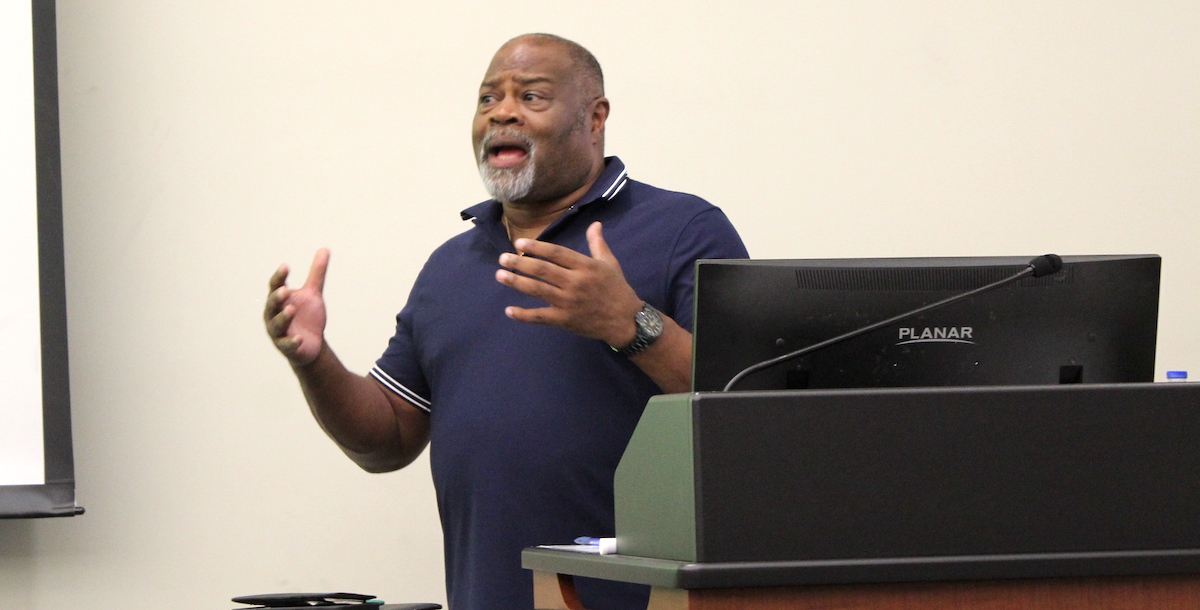Constitution Day lecturer paints grim picture of U.S. Supreme Court’s decision to overturn affirmative action

Kevin Brown, the Mitchell S. Willoughby Distinguished Professor at the University of South Carolina School of Law, addressed members of the PC community at the college annual Constitution Day Lecture.
Last summer’s decision by the U.S. Supreme Court to overturn affirmative action will set civil rights back generations, a law professor said Wednesday at a Constitution Day lecture at Presbyterian College.
Kevin Brown, the Mitchell S. Willoughby Distinguished Professor at the University of South Carolina School of Law, did not mince words about the consequences of the court’s June 29 decision to end affirmative action by ruling against the admissions policies at Harvard University and the University of North Carolina.
Brown said the ruling overturned years of precedence based on prior courts’ interpretation of the Equal Protection Clause in the U.S. Constitution’s 14th Amendment, which states:
“No State shall make or enforce any law which shall abridge the privileges or immunities of citizens of the United States; nor shall any State deprive any person of life, liberty, or property, without due process of law; nor deny to any person within its jurisdiction the equal protection of the laws.”
Affirmative action, he said, was the court’s previous response to segregation and remained the nation’s most prominent race-conscious program to even the playing field for people of color.
“The Harvard admissions case marks, then, the definitive closing of the final chapter of the Desegregation Era,” he said. “With this opinion, American society, at least for constitutional purposes, has been completely launched into the colorblindness era.”
Brown argued that the country’s history of slavery and segregation, as well as its census policies classifying people by race, proves that the U.S. has never indeed been colorblind in the past.
“After all, there would have been no affirmative action programs had there not been enslavement and segregation before,” he said.
Critics may argue that ignoring race is the only way for people to cross racial and ethnic lines, but they forget what people of color experience, Brown said.
“Colorblindness does deny the lived experiences of people of color that are shaped by race,” he said. “I think you’ll understand as I go through this, you could not really understand or get to know me. Without understanding race, there really is no Kevin Brown outside of being African American. The implications of colorblindness are different when it’s applied to education, politics, economics, and the law. The problem with colorblindness when applied in those areas, is that it will freeze in place the existing racial disparities that exist in our society.”
Brown said he believes the Supreme Court’s decision to end affirmative action will also allow schools, neighborhoods, businesses, and other institutions to re-segregate under the protection of the law.
“A majority of the justices for the first time, in this case, say we should treat these policies and programs directed at reducing racial disparities in our society, the same way that you would treat the segregation and enslavement statutes that had created the racial disparities in the first place,” he said.
Brown said the Equal Protection Clause was considered a check on the tyranny of majority rule. Now, he argued, conservative justices say the clause is not to help minority groups but individuals.
As one of the first scholars to study and embrace Critical Race Theory in the late 1980s, Brown said there were warning signs of what would come if the Supreme Court reversed itself on affirmative action and other programs protecting civil rights.
“We knew about the racially oppressive side of colorblindness,” he said. “We knew that the problem of colorblindness, when applied to educational, economic, political, or criminal justice issues, would simply freeze into place to racial disparities.
“So, we knew that colorblindness would leave our society unable to deal with the racial disparities that existed because you couldn’t take into account race in order to attack the disparities, and this colorblindness freezes it into place.”
Despite the controversy surrounding CRT, Brown explained that, at its core, it recognizes that after centuries of enslavement, oppression, and segregation, the dominant American cultural belief is that Black people are supposed to have less.
“When a society that has always believed black people should have less, this belief gets passed down from generation to generation, just like our belief in democracy, just like our belief in capitalism, just like our belief that people should go to college to get a good education,” Brown said. “What we are arguing is that we have to root this out of our society because, if we don’t, the racial disparities will remain.”
Brown warned African Americans that a new age of segregation is coming.
“I could try to sugarcoat it,” he said. “I could try to obfuscate. But the reality is, this opinion on affirmative action was directly targeted to you. This was about your opportunities that you’re going to have in the future. And make no mistake about it, those opportunities have been substantially reduced. This is not the kind of opinion that you’re going to be able to overcome purely and simply by working harder. We are in a new racial age with this opinion, and you’re going to be the ones who are going to suffer the most.”
Brown said young people of color must become politically active and support lawmakers who want to change society instead of leading it backward.
